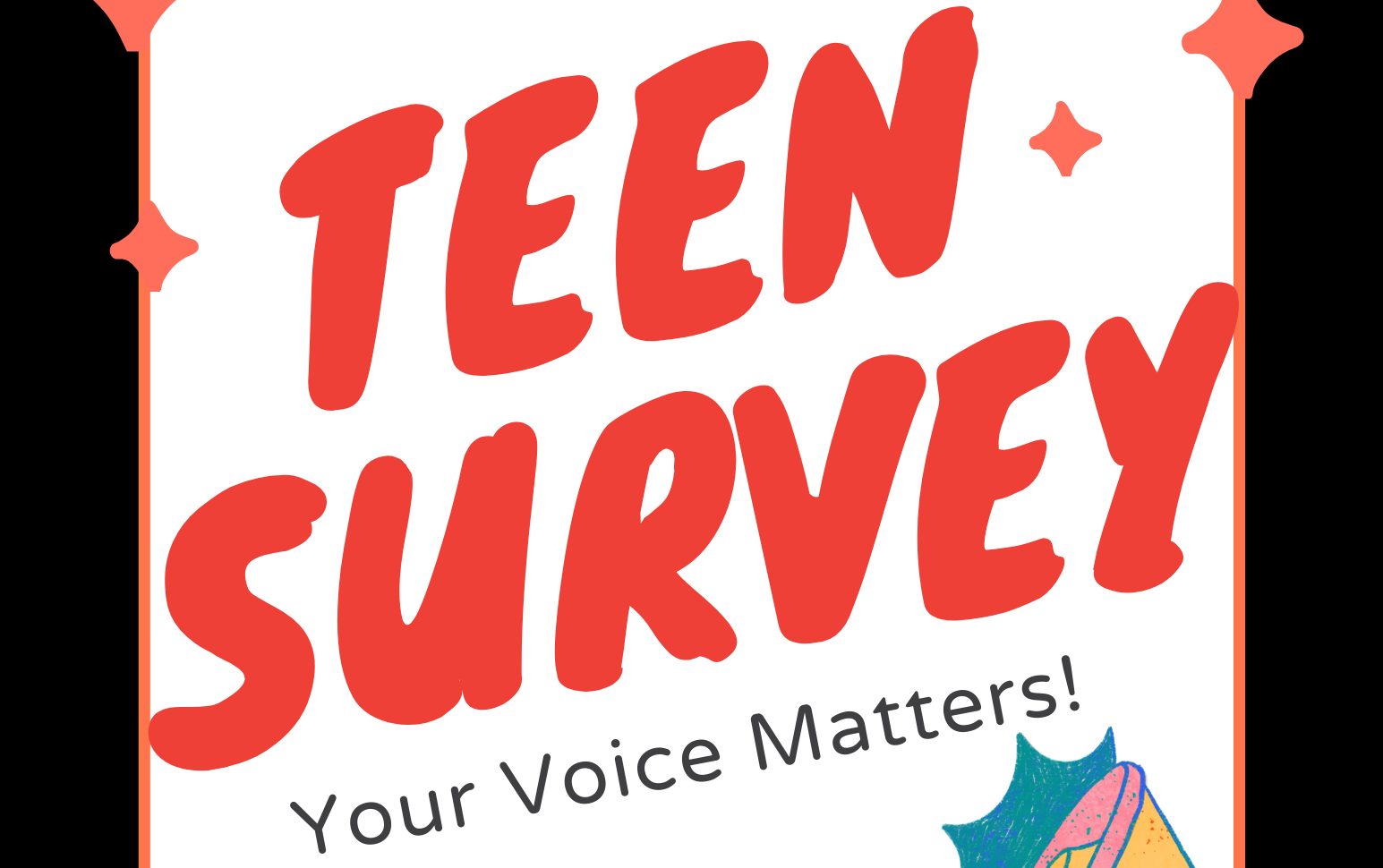Adult staff members were just arriving to our downtown office after the planes hit the World Trade Center in New York City on the morning of Sept. 11, 2001. Our teen newsroom, then located on Nassau Street next to Centennial Olympic Park, was just blocks from CNN Center and the Richard B. Russell Federal Building. Like so many people around the country, we were stunned — and unsure of what to do. I had just left my one-year-old at daycare nearby.
“Go home,” Andy Sarvady, our caring board of directors chairperson, called to say. “I’m not sure how to help or what to do, except to tell you to go be with your families. We’ll regroup later.”
Of course, we opened the next day to offer teens what VOX has been for them since 1993: a safe space for a diversity of young people to unite and express themselves. The next editions of VOX (we were mostly print-focused back then), included several powerful letters, responses, articles and poems. “Out of Tragedy Comes Greatness, Out of Pain Comes Strength,” wrote Stephanie Taylor from Avondale High School (now DeKalb School of the Arts). Hijrah Hamid, from North Atlanta High School, wrote a piece called “The Xenophobic Side of the USA,” while Abdirizack Ahmed from Chamblee High School wrote “Facts about Terrorism.”
We reached out to our sister publication in New York City and shared one Brooklyn teen’s personal story about the morning and aftermath of the attack. And, of course, we continued to share Atlanta teens’ stories, reflections and outreach to each other.
Here’s how one teen leader put it:
“We HAVE to address the current state our nation is in. We can’t go about pretending that this isn’t affecting us as teenagers. We have become more cautious and we need to be informed. …VOX has always promised to give you the cold, hard facts, and don’t expect this issue to be any different. I can assure you that VOX will give you the real deal through the eyes of teens like you. …So, prepare to learn from someone else’s experience and begin to move on and breathe anew.
Holla,
Stephanie Taylor”
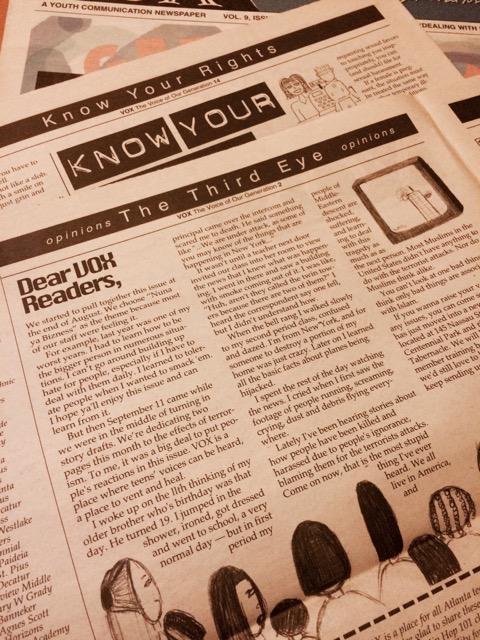
From the October 2011 print edition (“Learning to Cope Month”):
Dear Readers:
We started to pull together this issue at the end of August. We chose “Nuna ya Bizness” as the theme because most of our staff were feeling it.
For example, last year was one of my worst years. I had to learn to be the bigger person in numerous situations. I can’t go around building up hate for people, especially if I have to deal with them daily. I learned to tolerate people when I wanted to smack ‘em. I hope y’all enjoy this issue and can learn from it.
But then September 11 came while we were in the middle of turning in story drafts. We’re dedicated two pages this month the effects of terrorism. To me, it was a big deal to put people’s reactions in this issue. VOX is a place where teens’ voices can be heard, a place to vent and heal.
I woke up on the 11th thinking of my older brother whose birthday was that day. He turned 19. I jumped in the shower, ironed, got dressed and went to school, a very normal day — but in first period my principal came over the intercom and scared me to death. He said something like “…We are under attack, as some of you may know of the things that are happening in New York…”
It wasn’t until a teacher next door invited our class into her room to view what was happening. I went in there and saw a building with smoke coming out of it. I was like, “huh, aren’t they called the twin towers because there are two of them?” I heard the correspondent say one fell, but I didn’t understand how.
When the bell rang, I walked slowly to my second period class, confused and dazed. I’m from New York, and for someone to destroy a portion of my home was just crazy. Later I learned all the basic facts about planes being hijacked.
I spent the rest of the day watching the news. I cried when I saw footage of people running, screaming, crying, dust and debris everywhere.
Lately I’ve been hearing stories about how people have been killed and harassed due to people’s ignorance, blaming them for the terrorist attacks. Come on now, that is the most stupid thing I have ever heard. We all live in America, and people of Middle Eastern descent are shocked, suffering and learning to deal with this tragedy as much as the next person. Most Muslims in the United States didn’t have anything to do with the terrorist attacks. Nor do all Muslims think alike. …
If you wanna raise your voice about any issues, you can come see us …
Peace,
Haniyfa Muhammad
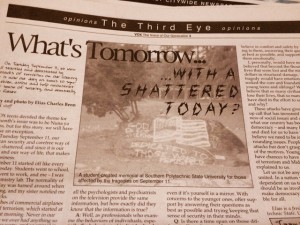 What’s Tomorrow With a Shattered Today?
What’s Tomorrow With a Shattered Today?
By Elias Charles Benn, October 2001, then freshman at Southern Polytechnic State University
On Tuesday, Sept. 11, we were all startled and devastated by attacks of terrorism on our country. It is now our duty as teens to sympathize, assist and help reconstruct our sense of security and, eventually, the future.
VOX teens decided the theme of this month’s issue was to be Nuna ya Bizness, but for this story, we will have to make an exception.
On Tuesday Sept. 11, our american security and carefree way of life was shattered, and since it is our country and our way of life, that makes it our business.
Sept. 11 started off like every other Tuesday. Students went to school, parents went to work, and me — I was in the chemistry lab. The normality of my Tuesday was turned around when my cell rang, and my sister notified me of the attacks.
…Although there are many stereotypes about teens, the undeniable fact is that today’s teens are tomorrow’s leaders, and our involvement today means a better society tomorrow. As U.S. Secretary of State Colin Powell said during a press conference, “They can destroy buildings…but they can never destroy democracy.” I say our generation will one day represent democracy.
Since that morning after the attack, experts have been appearing on different television networks, trying to console and counsel parents on precautionary steps to prevent young children and teens from the aftermath of such as tragedy.
I spoke psychologist Jo Ann Cochrane, Ph.D., a professor at Southern Polytechnic State University, to get some insight on what information the medical professionals were trying to get out to households through the media. …
Teens Spread the Message of Equality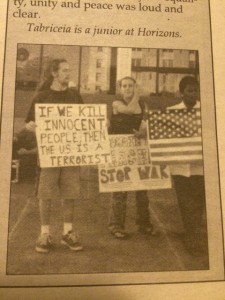
By Tabriceia Nealy, then junior at Horizons School in Atlanta
On Friday Sept. 21, the National Youth Connection held a rally outside the Richard B. Russell Federal Building in downtown Atlanta against war and racism. The rally was held in light of the terrorist attacks in New York and Washington, D.C., and served as a forum for young people to speak out about the mistreatment of Arab-Americans and the bombings of Middle Eastern countries. Most of the participants were between the ages of 16 and 25, which just goes to show how young people try to be catalysts for change. Although the turnout was small (about 50 people), they cry for quality, unity and peace was loud and clear.
Readers Respond to the September 11th Tragedy
It Really Happened
I was in Washington, D.C., right next to Ford’s Theater when the big incident happened. I was in D.C. because it was our school’s 8th grade trip. At first in the morning, right after it happened, I really didn’t realize what was going on around me. All I heard from teachers as that the World Trade Center was hit! …
I didn’t know the Pentagon was hit unitl I heard it on the radio. And then we passed the Pentagon, where [we] saw the smoke. … I then became afraid, but some of my friend were shaking with fear.
It felt weird that we were only minutes away from the Pentagon. It was a horrile and awful tragedy that hit America, just to know in our minds that we were being attacked and this was war. Our lives were at risk, and they still are. But just to know we could have been the ones who died, knowing we were so close to one of the buildings that got hit, it was awful to think about, even on the tiring 12-hour bus ride home.
– Nikki Freedman, then 13, 8th grader at Greenfield Hebrew Academy (now Atlanta Jewish Academy)
I really feel sad for the families that lost their loved ones. I was so surprised when this tragedy occurred. I thought it was just some kind of accident; I didn’t know how serious it was.
Everywhere I go people are talking about it, and it really bothers me. I know that i’s really sad for people to do this kind of stuff to others.
The other side is after this tragedy occurred people came together, and it is a really good thing we are united. I hope we always will be. And if the war begins, somehow I hope everybody stands shoulder-to-shoulder and deals with it.
I really wanna turn back the hands of time wishing all this sh-t never happened. On the other hand, I really think the soldiers or whoever hijacked the plane really believed in their religion. Everybody knows terrorists already plan everything out and they know 100 percent it is going to go well. But I think the one they are after all along is the president. … I just hope this sh-t is all a dream.
– Thai, then 15, DeKalb Community School (an educational program of Georgia Department of Juvenile Justice)
The Xenophobic Side of the USA
By Hijrah Hamid, then freshman at North Atlanta High School
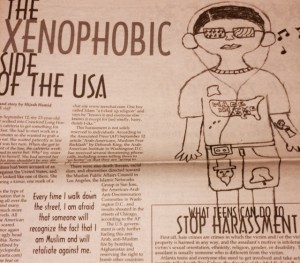 On Sept. 12, my 23-year-old sister walked into Crawford Long Hospital’s cafeteria (now Emory Midtown) to get something for breakfast. She had to start work in a few minutes so she wanted to grab a bite to eat. She waited patiently until it was her turn. When she got to the front of the line, the cafeteria worker refused to serve her. Why? My sister thought to herself. She had served her before; this time shouldn’t be any different. But this time was different. This time Muslims had been accused of an atrocity against the United States, and my sister looked like one of them. She was wearing a kimar, one mark of a Muslim.
On Sept. 12, my 23-year-old sister walked into Crawford Long Hospital’s cafeteria (now Emory Midtown) to get something for breakfast. She had to start work in a few minutes so she wanted to grab a bite to eat. She waited patiently until it was her turn. When she got to the front of the line, the cafeteria worker refused to serve her. Why? My sister thought to herself. She had served her before; this time shouldn’t be any different. But this time was different. This time Muslims had been accused of an atrocity against the United States, and my sister looked like one of them. She was wearing a kimar, one mark of a Muslim.
This is the type of discrimination that is happening all over the country, and many times on much more extreme levels. All because American people are scared. They are once again rearing the ugly head of xenophobia. Xenophobia is defined by Encarta encyclopedia as “an intense fear or dislike of foreign people, their customs and culture, or foreign things.”
… Now we must all stamp out the Arab-Americans and the Muslim-Americans so they can’t hurt us any more. This idea scares me. It scares me a lot. I am a Muslim-American, and every time I walk down the street I am afraid, afraid that someone will recognize the fact that I am Muslim and retaliate against me. People who look like me, people who act like me, people who believe what I believe are being killed for having these attributes.
Along with the acts of violence, anti-Muslim and anti-Arab literature has been spread on the internet. I have witnessed chat room harassment when I have visited popular teen chat site www.teenchat.com. …
This is not the first time an ethnic or religious group has been singled out in this country because of something people on the other side of the world did. One hundred twenty thousand Japanese-Americans were rounded up and taken to camps under the leadership of President Franklin D. Roosevelt after the attack on Pearl Harbor to supposedly protect American people.
Arab-Americans and Muslim-Americans are just as angry as everyone else. We want to mourn the loss like everyone else. However, we can’t because we’re constantly looking over our shoulder.
What teens can do to stop harassment
First off, hate crimes are crimes in which the victim and/or the victim’s property is harmed in any way, and the assailant’s motive is intolerance of the victim’s sexual orientation, ethnicity, religion, gender or disability. The assailant is usually someone who is different from the victim.
Atlanta teens and everyone else need to get involved and take action. I recently talked with Ilise Cohen, [then] director of the Middle East Peace Education program, a program of the American Friends Service Committee. She gives some tips on what anyone can do to help stop hate crimes …
- Take a good look at the attacker
- Get the name, address and phone number of all witnesses
- Call 911 or your local police precinct
- Report the crime as a hate crime (even to your principal if it happens at school)
- Take down the badge number and comments of all police officers involved
- You can go to a prejudice-reduction workshop hosted by the National Coalition Building Institute
- You can get connected with Help Increase the Peace (HIP), a violence-prevention, conflict-resolution program




